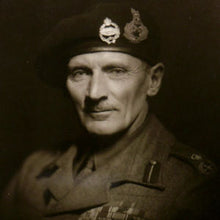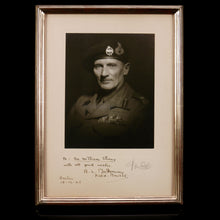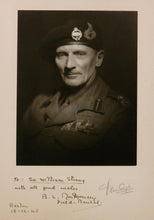Field Marshal Montgomery Signed Presentation Portrait Photograph, Berlin 1945
Adding product to your cart
Overall: 36cm (14.2in) x 26cm (10.2in)
Monochrome quarter length studio portrait of the Field Marshal in battle dress and twin badged beret by court photographer Herbert Vandyk (1879–1943) (image size: 20.3cm (8in) x 15.3cm (6in)), inscribed in FM Montgomery's hand in the lower mount 'To: Sir William Strang / with all good wishes. / B.L. Montgomery / Field-Marshal. / Berlin / 18-12-45’. Framed and glazed.
Sir William Strang was the political adviser to Field Marshal Montgomery (1887-1976) in occupied Germany in 1945. He reportedly took a tough stance in his dealings with the defeated enemy and was impervious to concerns that the Germans might turn in desperation to Communism. In response to the woes of the mayor of Hamburg, Strang recalled in his 1956 memoir ‘Home and Abroad’, ‘I interrupted this exercise in self-pity and covert blackmail to say that we were determined that there should be no repetition of the two world wars brought about by Germany, and this was the purpose of our alliance with the Soviet Union. The primary purpose of the occupation was to disarm and demilitarise Germany and to uproot the Nazi party, not to promote Anglo-German friendship or to bring about the economic revival of Germany …’
Read more
Baron Strang of Stonesfield, GCMG, KCB, MBE, (1893-1978) was educated at University College, London and the Sorbonne. He was commissioned into the Worcestershire Regiment in 1915 and joined the Diplomatic Service in 1919. He served at the British embassy in Belgrade from 1919 to 1922, at the Foreign Office from 1922 to 1930 and at the embassy in Moscow from 1930 to 1933. During his time in Moscow he played an important role in the Metro-Vickers engineers trial, in which six British engineers were accused of spying. He returned to the Foreign Office in 1933 and was an adviser to the Government at major international meetings, and met Mussolini, Hitler and Stalin. Strang was a tacit opponent of appeasement, but always stayed loyal to the Government. He was present at the major conferences between the Allied leaders during the Second World War. In 1943 he was appointed the British representative on the European Advisory Commission, with the rank of ambassador, to study possible post-war political problems and make recommendations but the commission was dissolved at the Potsdam Conference of July / August 1945. Strang returned to the Foreign Office in 1947 and served six years as Permanent Under-Secretary of State during the implementation of the Marshall Plan, the formation of the Western European Union, the formation of NATO, and the Berlin airlift. He retired from the Foreign Office in December 1953 after fainting during Elizabeth II's coronation in Westminster Abbey. In 1954, he was raised to the peerage as Baron Strang of Stonesfield in the County of Oxford. He later served as a Deputy Speaker and Deputy Chairman of Committees in the House of Lords and as Convenor of the Crossbench Peers.






